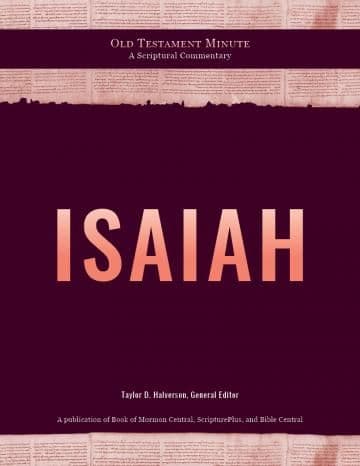Book
34 Chapters

Chapter 26 begins with a song to be sung in the land of Judah, and it is difficult to tell where this song of praise ends; however, it is full of doctrine. He begins by describing a city that God has made, and verse 2 suggests that its gates are open wide to receive the righteous nation that keeps faith.
26:3. This verse is sublime as the words might be sung,
You will keep in perfect peace,
Him whose mind is steadfast
Because he trusts in you.
26:4. “Trust in the Lord forever, for the Lord, the Lord is the rock eternal.”
26:5. The prideful city is destroyed in contrast with the establishment of the righteous city in verse 1. He humbles the people in that city in contrast with verse 1 and verse 7, where the footsteps of the righteous travel in a way that is smooth.
26:8–9. Compare with the highway mentioned in Isaiah 35:8 where those on that highway also walk in the way of the law.
Yes, Lord, walking in the way of your laws, we wait for you.
Your name and renown are the desire of our hearts.
My soul yearns for you in the night;
In the morning my spirit longs for you.
Notice in these lines the obvious desire to be like the Lord.
What a beautiful description of a quiet, contemplative night and morning where we have given time to a conversation with our Maker.
26:9–10. These verses express the idea “And even when your judgments come upon the earth, it is possible for the people of the world to learn righteousness.” But verse 10 explains, “though grace is shown to the wicked, they do not learn righteousness, even in a land of uprightness, they go on doing evil and regard not the majesty of Jehovah.
26:11–12. We have noted earlier the hand that is stretched out still. In verse 26:11, we read, “Lord, your hand is lifted high, but they do not see it.” Then in verse 12, he speaks of establishing peace and gives the credit to God for all that they have already accomplished, vowing (in verse 13), “your name alone do we honor.”
26:16. Addressing the Lord, and repeating the theme of the first part of this revelation, he says, “When you disciplined them, they could barely whisper a prayer; comparing this whisper to a pregnant woman who is about to give birth as she writhes and cries out in pain. “So were we in your presence, Oh Lord. We were with child. We were in pain.”
26:19. This verse is juxtaposed with verse 18, which tells of the resurrection: “But your dead will live; their bodies will rise, you who dwell in the dust; wake up and shout for joy. Your dew is like the dew of morning. The earth will give birth to her dead.” How does the idea of giving birth relate to verses 16–19? Examine Isaiah 27:18: “we have not brought salvation to the earth. We have not given birth to people of the world,” and verse 19, “The earth will give birth to her dead.”
26:20–21. These verses refer to Passover as he instructs the people to “enter their homes, shut the doors, hide yourselves until his wrath has passed by.”
He is about to punish the people of the earth “for their sins.” The earth will disclose the bloodshed upon her. She will conceal their shame no longer.
Ignore the chapter break between chapters 26 and 27.
Book
34 Chapters
Items in the BMC Archive are made publicly available for non-commercial, private use. Inclusion within the BMC Archive does not imply endorsement. Items do not represent the official views of The Church of Jesus Christ of Latter-day Saints or of Book of Mormon Central.